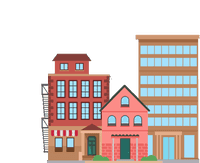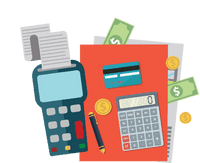If you’re new to Canada and looking to apply for a mortgage, you’re likely wondering what the process entails. The great news – there’s a helpful program offered by CMHC known as the “Newcomers to Canada” program. This housing program provides financial assistance and makes it possible for new immigrants to buy a home in Canada. If you’re looking buy a home in Canada, here’s everything you need to make this purchase as a newcomer:
If you qualify, you can make a down payment as low as 5% on a home worth $1 million or less. If you’re looking to buy a home over the $1 million mark, you’ll likely be paying a down payment of 35% or higher.
Who provides mortgages for “newcomers” in Canada?
When it comes to getting a mortgage, there are both A lenders and B lenders. Traditional lenders such as banks, monoline lenders or credit unions are considered A lenders. They focus on customers with strong credit scores (or proof of credit) and a reliable source of income. Then, there are B lenders. These institutions usually offer a lower barrier of entry to qualify for a mortgage with the chance of a higher interest rate. The B option typically appeals to homebuyers who don’t have a strong credit history, cannot provide guaranteed income or may have trouble qualifying for a mortgage with an A lender. A company like ours at Homewise works with all of these types of lenders and can provide a full overview of what the best option(s) would be or your unique profile.
How quickly can I get a mortgage in Canada?
If you’re a new Canadian with a working permit, you need to be in Canada for at least three months to prove that you are able to make your monthly mortgage payments.
If you’re a permanent resident, you are required to provide proof of full-time employment for three months. If you are self-employed, proof of employment and two years of tax documentation is required.
If you do not live in Canada, there are some big banks that may provide a mortgage if at least a 35% down payment is provided.
What is the maximum amount I can get a mortgage for?
Technically, there is no maximum amount you can receive from the “Newcomers to Canada” program. However, to be eligible, the home price must be $1 million or lower. The amount you receive for a mortgage is dependent on the size of your down payment. This can come from sources such as savings, the sale of a property or a financial gift from a relative. When applying for a mortgage, you’ll need to provide the following:
Documents proving a steady source of income
Work permit or permanent residency in Canada.
For down payments between 5-9.99%
You will need to provide a copy of an international credit report with a strong credit score that proves you can support your monthly payments. Alternatively, you could also validate your credit through rental payment history or utility bills such as your gas or water bills.
For down payments of 10% or more
You will need six months of bank statements or a letter of reference from a Canadian financial institution. This information will indicate whether you are eligible and able to make your monthly payments.
Can I participate in the “Newcomers to Canada” program if I’m self-employed?
If you’re self-employed and interested in participating in the “Newcomers to Canada” program, you’ll be required to show at least two years of taxed income in Canada. If you are unable to gather these documents, you’ll need to make a down payment of 65% and have a provable source of income to support your application.
What are the credit requirements to participate in the “Newcomers to Canada” program?
If you’re a permanent resident, at least one borrower must have a minimum credit score of 680 to qualify. CMHC may consider alternative ways of establishing creditworthiness for borrowers without a credit history. For example, if you are a recent graduate and newly divorced.
What if I have no credit history in Canada?
If your home country is the U.S., U.K., or South Africa (non-permanent resident) and you don’t have any credit history in Canada, some lenders will still consider your application. In some cases, lenders will look at your foreign credit history to get a better understanding of your eligibility. For all other countries, where the creditworthiness cannot be verified through an international credit record, you’ll likely have to provide a letter of reference from your financial institution in your country of origin.
What documents do I need from my home country?
When applying for the “Newcomers to Canada” program, you’ll need to provide key documents such as your work permit, full-time/part-time salary or guaranteed hours of employment and at least three months of bank statements that show an income stream.
Can I buy a house on a work or study permit?
Yes, you can. In this case, you would need to have provable income, a valid work permit or permanent residency to qualify.
Are there penalties for buying property as a foreigner?
There is a Foreigners Tax, also known as the Non‑Resident Speculation Tax (NRST). NRST is a 15% tax on the purchase of residential property located in the Greater Golden Horseshoe Region by someone who is not a citizen or permanent resident of Canada.
At Homewise, we work with over 30 banks and lenders to help new Canadians find a mortgage that best suits your unique circumstances. If you’re a newcomer to Canada and interested in purchasing a home, get pre-approved for a mortgage in just five minutes HERE. One of our Mortgage Advisors will get in touch and personally assist you at every step of the process.








